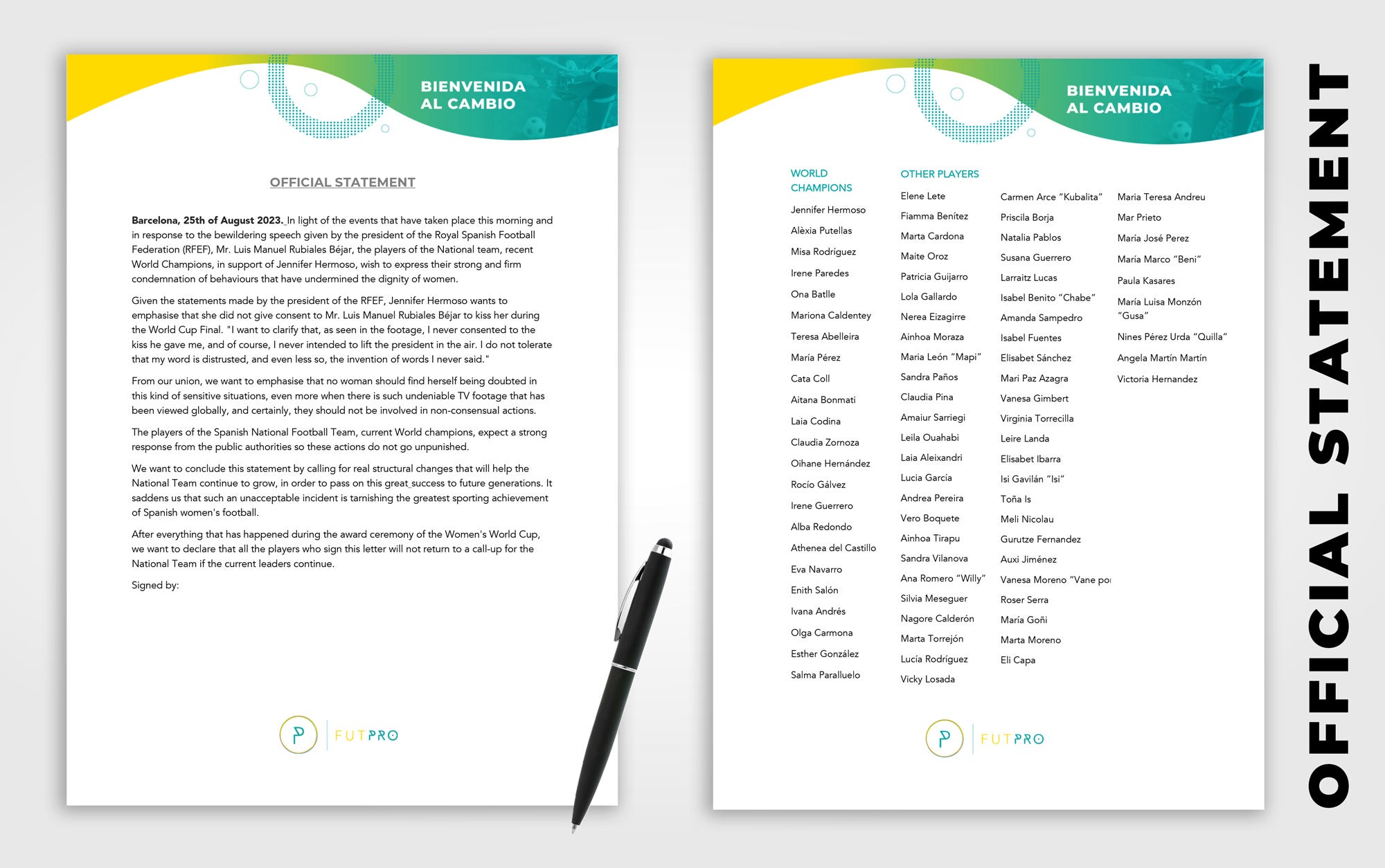We could have just believed women
This Women's World Cup celebration week didn't have to turn into a nightmare.
The week after the Women’s World Cup should be a celebration of the excellence of women’s sports. It should be a week where we are virtually partying alongside the Spanish players, lifting up the English players, rejoicing for the teams and players from all over the world — Vietnam to Nigeria, Haiti to New Zealand — who made this World Cup so special. As a collective fan base, we should be doing a victory lap with news that the tournament generated close to $900 million in revenue, was attended by almost two million fans, and set viewership records around the globe. We should be focused on converting all of these new women’s soccer fans over into the world of club soccer. We should be happy, damnit.
Instead, the last week has been spent focused on Luis Rubiales, the president of the Spanish football federation (RFEF), who grabbed Spanish star Jenni Hermoso by the face and pulled her in for a kiss on the lips amidst the trophy ceremony at the Women’s World Cup on Sunday.
During what should have been the happiest moment of Hermoso’s life, she was sexually assaulted on live television and in front of a crowd of 75,784 at Stadium Australia in Sydney. It was an absolutely despicable abuse of power and a complete abdication of professionalism. It was, in every sense of the world, inexcusable.
I’m going to try to quickly (hah) sum up just a few of the things that have happened in the five days since:
In a since-deleted video on social media very soon after the kiss, Hermoso said of the incident, “I did not like that, but what can I do?”
Following the initial criticism on Sunday, Rubiales said, “We shouldn’t pay attention to idiots and stupid people.”
On Monday, Rubiales issued a tepid apology for his actions, saying, “Here we saw it as something natural and normal. But on the outside it has caused a stir, because people have felt hurt by it, so I have to apologize; there's no alternative.”
Also on Monday, there was a statement said to be given by Hermoso to news agency EFE defending Rubiales: “It was a mutual, totally spontaneous gesture because of the huge joy of winning a World Cup. The 'presi' and I have a great relationship. ... It was a natural gesture of affection and gratitude.”
On Tuesday, Spain’s acting prime minister, Pedro Sánchez, called Rubiales’s actions “unacceptable” and his apologies “not sufficient.
Also on Tuesday, Relevo reported that Hermoso’s statement had been written by RFEF’s communications department, and that Hermoso refused to appear in Rubiales’s “apology” video.
On Wednesday, FUTPRO, the players’ union representing Hermoso, announced it was “working so that the acts like the ones we witnessed don’t go unpunished, are sanctioned, and that pertinent measures are adopted to protect the soccer players against actions that are unacceptable.” Hermoso said that the union and her agent would “defend my interests and speak on my behalf.”
On Thursday, FIFA opened a case against Rubiales to determine if he violated “the basic rules of decent conduct” and “behaving in a way that brings the sport of football and/or FIFA into disrepute.”
There were multiple reports from Spanish outlets on Thursday that Rubiales was going to resign.
But on Friday, Rubiales gave a defiant speech in front of at an emergency general assembly of the federation. He repeated four times that he refused to resign. According to the Associated Press, Rubiales “was applauded by the overwhelming male assembly.”
“Do you think this [incident] is so serious that I should go, after the best management in the history of Spanish football? Let me tell you: I'm not going to resign. I'm not going to resign. I'm not going to resign,” Rubiales said. “I've come under a lot of pressure. Perhaps somebody will look to remove me on Monday. But we live in a country of laws. Is a consensual kiss enough to remove me? I'm going to fight until the end.”
He defended the kiss by citing his “great relationship with all the players,” and by saying Hermoso hugged him and lifted him off the ground in celebration. He said he asked permission for a kiss, and Hermoso granted it. “These people are trying to assassinate me and I'm going to defend myself. The false feminists destroy people,” he continued. “The press, in the majority, will keep killing me but I know the truth, and what my family and the people who love me think. The truth is the truth.”
Rubiales did offer one apology — for grabbing his crotch as part of the victory celebration in the close vicinity of the Queen and her 16-year-old daughter. “In a moment of euphoria, I grabbed that part of my body,” Rubiales said. “I was looking at [coach] Jorge Vilda. We've been through a lot this year. People have wanted to do the same to [Vilda] that people are doing to me, with a false narrative. We've suffered a lot. I got very emotional and lost control. ... I must apologise to the Queen, the Infanta and the Royal Household. My sincere apologies.”The Spanish government started the legal process seeking to suspend Rubiales.
Hermoso came out and said that Rubiales’s description of the kiss in his speech was “categorically false and part of the manipulative culture that he himself has generated.” She continued, “I feel the need to report this incident because I believe that no person, in any work, sports, or social setting should be a victim of these types of non-consensual behaviors. I felt vulnerable and a victim of an impluse-driven, sexist, out of place act without any consent on my part.”
She said she and her friends and family members have been repeatedly pressured this week to make statements in support of Rubiales. Perhaps most notably, she said, “what everyone has been able to witness on live television during the celebration also comes with attitudes like the one we saw this morning and have been part of our team’s daily life for years.”The Spanish players, absolutely outraged by Rubiales’s speech, released a joint statement — signed by the 23 World Cup players and 58 other players in the program — announcing they were boycotting the national team until leadership changes were made.
Is your head spinning? Extremely same.
But here’s the thing: Every single thing that has happened this week was entirely preventable.
If only the people in charge had listened to the players when they “complained of a lack of professionalism from the team’s technical staff and the RFEF,” per the Athletic. If only the people in charge had listened to the players when they “complained about the behavior of certain coaches” and “said they were asked to keep the doors of their rooms open before midnight in hotels where they were based, made to tell coaches where and with whom they were going if they went out for a walk and forced to show the contents of their bags if they bought something during a training camp.”
If only the people in charge had taken it seriously when 15 players sent a individual letters to the RFEF eight months before the World Cup kicked off saying that they were not available to play for the national team because the situation was “greatly affecting [their] emotional state and therefore [their] health.” If only the people in charge had taken action when seven of those fifteen players refused to make themselves available for the World Cup team, in part because head coach Jorge Vilda and Rubiales still had their jobs.
Imagine, just imagine, how joyous this week could have been if we had just believed women from the start.
Women athletes don’t start fights against their federations for fun. They don’t do it for attention — or at least, not for the type of attention that critics think they’re looking for. They don’t put their careers and dreams on the line for petty grievances or minor inconveniences. This shit? It’s exhausting and debilitating and absolutely terrifying. It’s the last-case-scenario option after dealing with years upon years of mistreatment.
But we’re here because — as María León, one of the Spanish players who boycotted the World Cup, pointed out on Twitter — the complaints of the players were dismissed as a “simple tantrum.”
Sure, it’s been inspiring to see the Spanish players and women soccer players from all over the globe speak out against Rubiales’s abuse and misconduct this week. It’s been moving to watch these women use the spotlight provided by the biggest win in their professional careers to fight for accountability and justice. And it’s been somewhat encouraging to finally see some of the men on the Spanish national team join the fight.
But mostly, this week has been heartbreaking.
If this is what the Spanish players are having to deal with publicly, then I absolutely shudder to think about what they’ve been subjected to privately for decades. And unfortunately, we know the Spanish team is not alone in facing abuse from the coaches and federation that are supposed to be supporting them; this problem runs rampant in women’s soccer.
I can’t stop thinking about the powerful men who applauded Rubiales’s speech on Friday, the men who found inspiration in the audacious anger of an abuser. These are the men who refused to act when the players initially made their complaints last year. These are the men that didn’t believe the women.
And now, these men will likely use the players’ on-field success against them. They will point to the trophy that the woman won with their talent, perseverance, hard work, blood, sweat, and tears, and use it to justify the leadership and behavior of the men in charge. As their rounds of applause ring through my ears, I fear that the women’s success will work against them, which is yet another reason why, as I wrote earlier this month, support and safety in women’s sports can’t be contingent on success.
Because do I know, for sure, that the Spanish team would have won the World Cup without Rubiales and Vilda at the helm? Of course not. Nobody can say that for certain. But they sure as hell should have been given the opportunity to try.





Thanks for putting it into words. It is heartbreaking. And enraging.